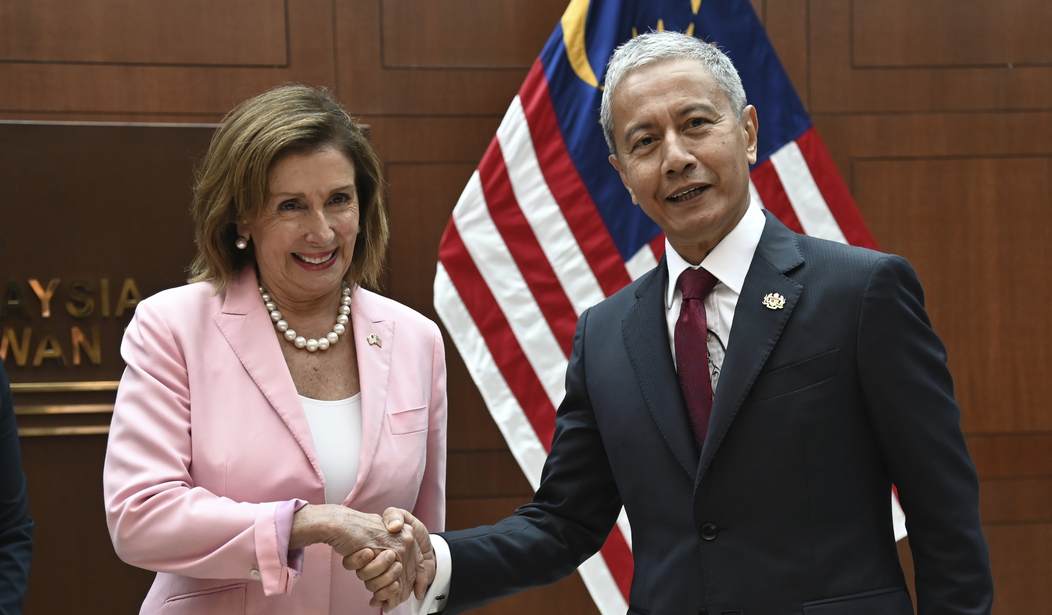China continues to retaliate against the United States and Taiwan for the visit of House Speaker Nancy Pelosi, and some of its moves are seen as signals of long-term hostility toward Washington.
China cut off most communication channels with the American military and broke off cooperation on climate change action. The communications cut-off comes on the heels of several provocative military moves, including firing missiles over Taiwan that landed in the Taiwan Strait.
The White House invited China’s ambassador, Qin Gang, to the White House, where he received a dressing down for China’s provocative acts. White House spokesman John Kirby on Friday condemned the decision to end dialogue with the United States as “irresponsible.”
This is no longer a matter of President Xi showing strength in advance of the important Communist Party meeting later this month. A spokesman at the Chinese embassy in Washington said at a news conference that Pelosi’s mission has had “a severe impact on the political foundation of China-U.S. relations, seriously infringed upon China’s sovereignty and (territorial) integrity and … undermines peace and stability across the Taiwan Straits.”
Strong words. But is it just Communist bluster, or is it a warning that relations between the U.S. and China are about to change — for the worse?
Ominously, experts in China-U.S. relations warned that China’s diplomatic and military moves appeared to go beyond retaliatory measures for the visit and could open a new, more openly hostile era, and a more uncertain time for Taiwan’s democratic government.
China-U.S. relations are “in a downward spiral,” said Bonnie Glaser, head of the Asia program at the German Marshall Fund.
“And I think that China is likely to change the status quo in the Taiwan Strait in ways that are going to be harmful to Taiwan and are going to be disadvantageous to the United States,” Glaser said.
If it were just China firing off a few missiles and breaking communications for a few months in a symbolic effort to fight climate change, U.S. officials might not be worried. But it’s the other “punishments” China is administering to the U.S. that are a little more significant.
On Friday, China’s Foreign Ministry said dialogue between U.S. and Chinese regional commanders and defense department heads would be canceled, along with talks on military maritime safety. Cooperation on returning illegal immigrants, criminal investigations, transnational crime, illegal drugs and climate change will be suspended, the ministry said.
China’s actions come ahead of a key congress of the ruling Communist Party later this year at which President Xi is expected to obtain a third five-year term as party leader. With the economy stumbling, the party has stoked nationalism and issued near-daily attacks on the government of Taiwanese President Tsai Ing-wen, which refuses to recognize Taiwan as part of China.
When the armies of two nuclear-armed nations aren’t talking to each other at high levels, there is cause to be concerned. But the real worry has to be the fate of Taiwan and whether or not China has decided to press the issue now.
If a war were to break out between Taiwan and China, it would be over before the United States could bring enough military assets to bear to make a difference. China and Taiwan know this. The Chinese have been on a substantial military building program, including the construction of three aircraft carriers. The last one, launched in late June, won’t be operational for three or four years. But by then, other modern systems will be online that would give China local naval superiority around Taiwan.
Taiwan’s mission is to stay viable until the U.S. can muster enough naval and air power to counter the Chinese thrust. But even then, there may be nothing for the United States to defend. Air Force Lt. Gen. S. Clinton Hinote, deputy chief of staff for strategy, integration, and requirements, conducted a war game between the U.S. and China over Taiwan. “At that point, the trend in our war games was not just that we were losing, but we were losing faster,” Hinote said. “After the 2018 war game, I distinctly remember one of our gurus of war gaming standing in front of the Air Force secretary and chief of staff, and telling them that we should never play this war game scenario [of a Chinese attack on Taiwan] again because we know what is going to happen.”
“The definitive answer if the U.S. military doesn’t change course is that we’re going to lose fast. In that case, an American president would likely be presented with almost a fait accompli,” he concluded.
Joe Biden may yet sleepwalk his way into a disastrous war with China.










